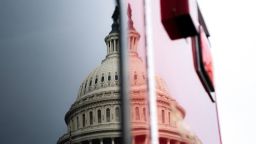Senate Faces Midnight Deadline as Shutdown Looms Over Funding Talks

Congress is approaching a critical deadline, with less than 24 hours remaining to avert a potential government shutdown. The Senate is set to vote on a Republican funding plan that has already been rejected by Democrats, creating an atmosphere of uncertainty as the midnight deadline looms. The ongoing stalemate, primarily focused on billions of dollars related to enhanced Affordable Care Act subsidies, has raised concerns that this could mark the first government funding lapse of President Donald Trump’s second term.
The situation intensified following a meeting on Monday, March 16, 2024, in the Oval Office involving President Trump and top congressional leaders. Unfortunately, this high-stakes gathering yielded no progress in negotiations. Senate Majority Leader John Thune has indicated that the upcoming vote is designed to apply pressure on Senate Minority Leader Chuck Schumer, who has thus far resisted a stopgap funding measure that does not include commitments to extend the Obamacare subsidies.
Schumer emphasized that the outcome hinges on Trump’s willingness to negotiate. “It’s now in the president’s hands. He can avoid a shutdown if he gets the Republican leader to go along with what we want,” Schumer stated. On the other side, Republicans have accused Schumer of using government funding as leverage in negotiations, insisting that the two issues should not be intertwined.
Even Sen. Josh Hawley of Missouri, a notable advocate for extending these subsidies, expressed skepticism about forcing a government shutdown over the matter. “I don’t understand what shutting down government has to do with that,” he remarked, urging a separation of the funding issue from the healthcare discussions.
As the clock ticks down, Republican leaders maintain that Schumer and his party will ultimately concede, especially in light of warnings from the White House’s budget office regarding potential mass layoffs if a shutdown occurs. They believe that public outcry over service disruptions and employee furloughs will pressure Democrats to relent. “Chuck Schumer is afraid of his own shadow, and he doesn’t want to be perceived as working with President Trump,” stated Republican Sen. Eric Schmitt of Missouri.
The GOP is preparing to continue voting on their funding extension, which aims to last until late November without any additional policy provisions. This strategy may lead to Democrats bending under pressure as the impact of a shutdown becomes more apparent. Should the government close, many congressional Republicans believe that the electorate will primarily blame Democrats for the impasse.
Democrats have consistently sought concessions related to healthcare in exchange for supporting government funding. Schumer and House Minority Leader Hakeem Jeffries argue that any agreement on healthcare subsidies must be codified into law to ensure the president follows through. Sen. Peter Welch, a Democrat from Vermont, highlighted the urgency of addressing healthcare issues, stating, “We’re going off a cliff, and we can’t leave Vermonters and Americans high and dry.”
The sentiment among Democrats is one of skepticism regarding the possibility of reaching an agreement before the deadline. Welch remarked, “I think the odds are against it right now, and I say that with a lot of regret.” Meanwhile, Sen. John Fetterman, the only Democrat who supported the GOP’s funding plan in a previous vote, expressed concern about the ramifications of a shutdown. “Millions and millions of lives will be upended,” he warned.
In summary, as Congress races against the clock, the potential for a government shutdown remains high. With both parties entrenched in their positions, the resolution appears increasingly elusive. The next few hours will be critical in determining whether the government will remain operational or face significant disruptions.






